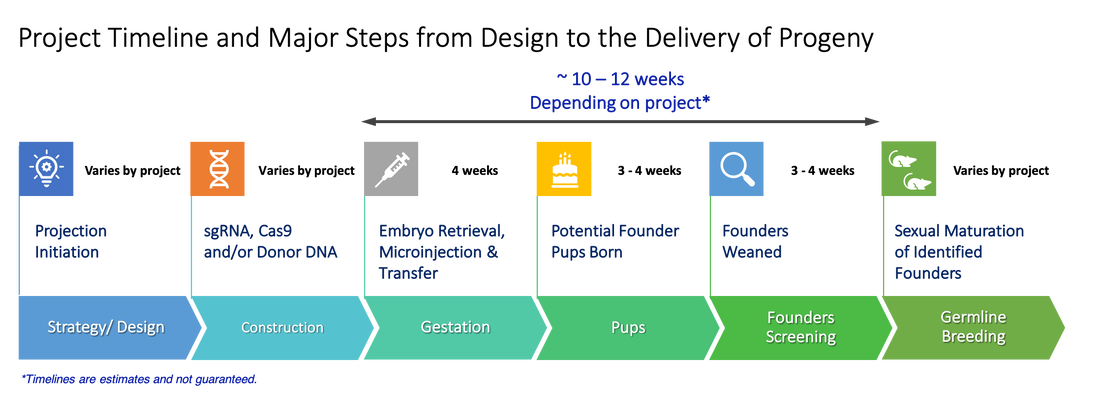GEM Generation Services
The mouse model creation services offered by LASEC are comprised of technical expertise, centralised facilities, sophisticated instruments, which is necessary to perform complex genetic modification and to produce genetically engineered mouse models (GEMMs).
Generally, CRISPR components (Cas9 mRNA, guide RNA, and DNA oligos/ plasmids as template if desired) are microinjected into mouse zygotes of desired inbred or specialty strains. After brief culture, all the surviving embryos are transferred to the oviducts of pseudopregnant female mice and carried to term. The average gestation time for mice is 19 to 21 days. Part of the new-borns will have incorporated the desired genetic modification at the targeted location. Once the pups are weaned, tailed, and numbered at 3-4 weeks of age, genomic DNA will be extracted from the biopsies of each potential founder. Subsequently, the genome editing will be analyzed and confirmed by polymerase chain reaction (PCR) and sequencing to identify transgenic founder mice carrying the intended mutation.
Endonuclease-mediated site-specific genome editing
- Knockout model by non-homologous end joining (NHEJ)
- Knock-in model mediated by homology directed repair (HDR) with a donor oligonucleotide/ plasmid
> Incorporation of point mutation (SNP)
> Insertion of a short fusion tag, such as HA or Flag
> Introduction of stop codon
> Creation of precise DNA deletion
> Insertion of loxP sites around one or more exons
> Swapping of the murine gene with its human ortholog
> Insertion of exogenous coding sequences encoding fluorescent proteins or Cre
Double-stranded plasmid donor DNA (Generally > 5 kb)
> Insertion of large fragment exceeding 5 kb in length *Very chanlleging*
Initiating a project
Model generation here begins with a discussion with us of your goals and determine the feasibility of your project. Contact our Laboratory Manager Ms. Heidi NG (Email: [email protected], Mobile: 6128 1647) to schedule an advisory meeting.
Pricing
It will be provided based on the project complexity after assessment of project feasibility.
Useful information
- If you require a different mouse strain other than C57BL/6J, we may be able to accommodate your needs. However, there is a surcharge for custom strains since transgenic efficiency is lower in most of the custom strains.
- A valid AEEC number must be provided prior to commencement of service. The strain name should be clearly specified in the AEEC protocol.
- Completed service request form should be returned to us prior to commencement of service.
- Our facility prioritises all service requests on a “first-come, first-serve” basis.

